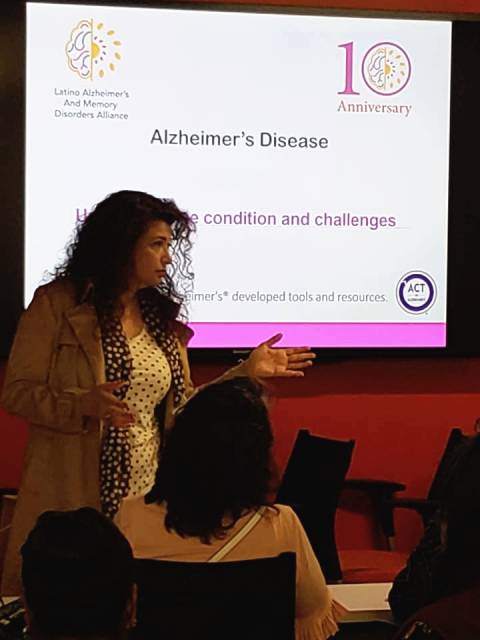You are here
More Than Just a Chat
In November 2020, when Constantina Mizis learned that her father was fighting a serious COVID-19 infection, the global pandemic suddenly became very personal. The virus ravaged her father’s lungs with such ferocity that only three days after diagnosis, he was gone.
“He only needed four more months, four more months to live, and he would have received a vaccine,” Mizis said. “He did not have the opportunity to choose life.”
Mizis, founder, president and CEO of the Latino Alzheimer’s and Memory Disorders Alliance (LAMDA), often recounts this personal and painful story when speaking with older Latino community members in Chicago about the importance of COVID-19 vaccination. LAMDA supports caregivers and family members in the Latino community as they navigate the significant and sometimes heartbreaking challenges of taking care of a loved one with Alzheimer’s or other memory disorders. The pandemic has only heightened these challenges and, with support from the CDC Foundation, LAMDA has been working to increase COVID-19 vaccine education and acceptance among these critical caregivers.
On August 13, 2022, LAMDA took part in the Latino Family Health Equity and Wellness Fiesta—an event focused on offering free and low-cost health services to medically underserved communities. The Fiesta brought in a crowd of over 400 people and included vendors offering a wide variety of health and wellness opportunities such as dental exams, Zumba instruction and tips on healthy cooking and food choices.
During this event, Mizis and the LAMDA staff invited people to take part in small group sharing sessions called charlas, Spanish for chats. Charlas typically involve no more than 7-10 people, and Mizis regularly uses these friendly conversations to bring community members together to share their concerns and experiences in an informal setting.
“We see that our community has a lot of fear around institutions or sharing personal health information due to their or a family member’s immigration status,” Mizis said. “But with charlas, we break through that fear.”
In the charlas, Mizis encourages participants to reveal their fears about COVID-19 and the vaccines, then she gently counters the misinformation that often fuels those concerns. These chats also give facilitators the chance to direct people to places to get vaccinated.
Throughout the Latino Family Health Equity and Wellness Fiesta, Mizis held a charla every 30 minutes to give the community many opportunities to access this support. She shared her story with participants and provided sobering information about Latino adults: according to the Centers for Disease Control and Prevention (CDC), only about half of Latinos are fully vaccinated against COVID-19. Many are surprised to learn the staggering truth that unvaccinated people over 50 are 42 times more likely to die from COVID-19 than those who are vaccinated and boosted. Compounding the problem, in many cases, Latinos are also more likely to be exposed to COVID-19 due to environmental and social factors.
As each charla ended, Constantina directed community members to the four promotoras on site – known as community health workers (CHWs) in English. The promotoras assisted each participant in navigating available health resources and registering to receive a COVID-19 vaccine.
To date, LAMDA has been responsible for 343 older Latinos getting vaccinated against COVID-19. “I see my father in each one of them,” Mizis said. “By getting a COVID-19 vaccine, they have chosen life.”
The Latino Family Health Equity and Wellness Fiesta was a successful opportunity for LAMDA to share this unique approach to connecting through conversations. Mizis will continue the charlas at future events with the hope of giving people a safe place to voice their concerns and the support they need to care for their loved ones and themselves.
This project is supported by the Centers for Disease Control and Prevention of the U.S. Department of Health and Human Services (HHS) as part of a financial assistance award totaling $22,724,994 with 100 percent funded by CDC/HHS. The contents are those of the author(s) and do not necessarily represent the official views of, nor an endorsement, by CDC/HHS or the U.S. Government.

